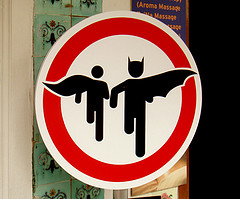Several months ago, this showed up in my Facebook feed:
And I thought to myself, there’s nothing quite like a sequel to degrade one of the greatest stories ever told on the stage.
You see, I have a long love affair with the Phantom. I have had since high school. I’m not certain why. I think that the poignant story and the magical musical score simply enchanted me. I went to see the Broadway production during my undergrad days, and was absolutely in stunned silence at the beauty of the production. Technically, musically, artistically, the Phantom is a masterpiece.
And the issue isn’t that I’m closed-minded to adaptations and new presentations. To the contrary, I was moved nearly to tears by the film adaptation of the show that arrived in theatres a few years ago. Of course, Webber was instrumental as a writer of the film production, as well. And, in fairness, Webber is the driving force behind the new show. It’s just that some things can’t be improved upon.
Of course, the same thing goes for prequels. DC Entertainment recently announced a set of prequels to the greatest graphic novel ever published, the Watchmen. My stomach turned. Was this a blatant attempt to capitalize on an amazing work of art? Simply because they own the rights to the story and the characters, they think that they can add to what was already a complete story simply to make money? I confess that I had a similar reaction to Love Never Dies. Was Webber selling out for money? Surely, if an artist were to ever have a comfortable income, Webber would.
A friend and fellow comic collector told me that it was a surety that I would at least read the Watchmen prequels, just to see what they were about. I responded that I wouldn’t read them on principle. Truth be told, I likely will scan one in my local comic shop. I may even put the DVD of Love Never Dies into our Netflix cue, as it is apparently living on DVD due to it’s poor reception in theatres (although I have read at least one opinion that the show’s theatrical demise was unfortunate). Part of me hopes that the Watchmen prequels are received poorly, as Moore has said that he accomplished everything he intended to in the original collection. Moore reportedly isn’t happy about the project, and I don’t think he was a fan of the film, either (for good reason…it was a disaster).
Still, the two projects are different in that, with Love Never Dies, at least the original writer is responsible for the project’s creation. And, I have to admit, from a design perspective, the show looks intriguing. I think, however, that I’m just stubborn enough to eschew both projects, simply because I don’t want to give in to what I see as selling out amazing work in order to make profit from the original.
Am I doing myself a disservice in my stubbornness? Would you see/read either of these? What do you think?

 Just before our daughter joined us a couple of months ago, I finished Part I of the novel that began brewing in my head during a train ride about two years ago. It began as an interesting idea about a dystopian future scenario, and blossomed from there for a year or so, percolating slowly in the back of my head before it became a workable idea. Then
Just before our daughter joined us a couple of months ago, I finished Part I of the novel that began brewing in my head during a train ride about two years ago. It began as an interesting idea about a dystopian future scenario, and blossomed from there for a year or so, percolating slowly in the back of my head before it became a workable idea. Then